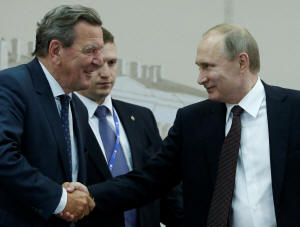Unrepentant Schroeder exposes German coalition rift over Ukraine
 Send a link to a friend
Send a link to a friend
 [April 25, 2022]
By Thomas Escritt and Paul Carrel [April 25, 2022]
By Thomas Escritt and Paul Carrel
BERLIN (Reuters) - The co-leader of
Germany's Social Democrats called on former Chancellor Gerhard Schroeder
to quit the party after he defended his ties to Russian President
Vladimir Putin, exposing a rift at the heart of government in Berlin
over the Ukraine crisis.
Schroeder has refused, despite Russia's invasion of Ukraine, to step
down from the posts with Russian energy companies from which he has
earned millions of euros since leaving office in 2004.
In a weekend New York Times interview he said Germany had also benefited
from his ties to Putin, though he said he would resign if Russia ever
stopped sending Germany gas.
Saskia Esken, the party's co-leader, said it was time to stop seeing
Schroeder, who held the top job for five years, as a former chancellor
and see him merely as a businessman.
"We called on Gerhard Schroeder to step down from Russian companies,"
she told DLF public radio on Monday.
"Sadly he didn't follow that advice. Schroeder has worked for years as a
businessman, and we should stop seeing him as an elder statesman, as a
former chancellor," she said, adding that he should quit the party.

RUSSIAN TIES
Schroeder heads a faction within Chancellor Olaf Scholz's party that
championed close ties to Russia as a way of binding it into a peaceful
European order.
Scholz has repeatedly said Schroeder does not speak for the government,
but has remained silent on whether he should quit the party.
Still, many in that wing of the party remain reluctant to send Ukraine
the heavy weapons Kyiv says it needs to turn the tide in the war,
something Scholz has been reluctant to do despite his coalition
partners' urgings.
[to top of second column]
|

Russian President Vladimir Putin shakes hands with former German
Chancellor Gerhard Schroeder during a meeting with heads of foreign
companies and business associations as part of the St. Petersburg
International Economic Forum 2016 (SPIEF 2016) in St. Petersburg,
Russia, June 17, 2016. REUTERS/Grigory Dukor
 In his Times interview, Schroeder
said he could not have been expected to return to being a lawyer
"dealing with rental contracts" after having been chancellor.
Instead, he lobbied for pipeline projects that critics said
heightened Germany's dependence on Russian gas.
Russia faces some of the toughest economic sanctions in history from
Europe and the United States, but continues to receive millions of
euros every day in energy payments from Germany.
The row poses a headache for Scholz, whose Green and liberal
coalition partners are as divided over Russia and on sending heavy
weapons to Ukraine as they are in agreement on the ambitious
domestic policy agenda they agreed last year.
"Germany should stop telegraphing signals about its economic
vulnerability to Moscow," senior liberal legislator Marie-Agnes
Strack-Zimmermann told a party congress at the weekend.
Friedrich Merz, the conservative leader whose party lost office in
December, is preparing to capitalise on the disarray, promising to
table a motion in parliament to send heavy weapons to Ukraine that
could split the coalition.
(Reporting by Thomas Escritt and Paul Carrel; Editing by Alex
Richardson)
[© 2022 Thomson Reuters. All rights
reserved.] This
material may not be published, broadcast, rewritten or
redistributed.
Thompson Reuters is solely responsible for this content.
 |